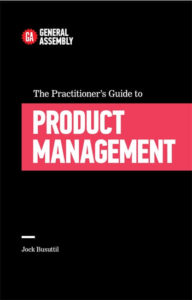
PRODUCTHEAD: The ethics of information (data ethics)
PRODUCTHEAD is a regular newsletter of product management goodness,
curated by Jock Busuttil.
product (mistreated)
tl;dr
Data ethics studies and evaluates moral problems related to data, algorithms and corresponding practices, in order to formulate and support morally good solutions
Product managers have ethical responsibilities that transcend career, company and profit
Organisations need to assess and build their trust and trustworthiness
Mitigate biases in your product that may have unintended discriminatory effects on individuals and social groups
a favour: please share this with other product people
every PRODUCTHEAD edition is online for you to refer back to
hello
If you’re anything like me, you’re probably feeling a bit battered by the seemingly relentless barrage of disinformation we’ve faced in recent years. The torrent of nonsensical opinions, assertions and outright lies has come at us from all sides, whether it was from the Trump administration in the US, or the Johnson government in the UK.
We’ve had holocaust deniers, climate change deniers, the anti-vaxx movement, even claims the Ukraine war is a hoax. And if you look hard enough, there’s usually somebody attempting to capitalise on the attention to peddle their latest cryptocurrency scam or NFT drop. It is stress-inducing and disorienting.
I take some comfort from knowing that more and more people are not just calling out these attempts to manipulate us, but also actively fighting back against disinformation with independently verifiable fact checking and reporting.
[Before you click, please note for your mental well-being that the following site contains distressing footage, and its content has been rated on a violence scale of one (minimal or no violence) to five (severely graphic).]
One such initiative is the Russia-Ukraine Monitor Map, a crowdsourced effort by the Centre for Information Resilience and others to reliably document significant incidents during the conflict in Ukraine.
An article I’ll be publishing in the next few days will take a more detailed look at disinformation and how to counter it. If that’s of interest, you can subscribe to I Manage Products to have it emailed to you as soon as it’s published (but don’t feel you have to).
So I’ve been thinking recently about the information we work with and how we should treat it to maintain ethical standards and transparency. Some companies have transparency at their core, Wise (formerly TransferWise) is one of them. They’ll tell visitors to their site when they can find a cheaper deal on currency exchange elsewhere. They could have easily chosen to hide that information, but instead chose to be transparent.
How does your organisation approach data ethics and transparency? Does it shy away from information that portrays it in a bad light and pretend that nothing’s wrong, or does it acknowledge that it needs to improve, and actively seek out ways to do so?
Does your organisation see user-centred data privacy measures such as the General Data Protection Regulation (GDPR) as a stifling constraint on business, or as a basic foundation on which to build to protect users?
Does your organisation do the right thing for people, or only what’s best for itself?
Speak to you soon,
Jock
what to think about this week
A code of ethics for product managers?
We’re all about getting things done. The right things done. But “right” means more than optimal, more than product-market fit or market share or profitability. Sometimes it’s the difference between right and wrong. Let’s talk about it.
What do you in the face of unethical behaviour?
[PHIL WOLFF / THE PRODUCT HOSPICE]
Introducing the ODI Trustworthy Data Stewardship Guidebook
By operating in a trustworthy way, organisations should be able to create value while limiting harms; and are more likely to be trusted by the people, organisations and ecosystems they interact with and rely upon.
The Trustworthy Data Stewardship Guidebook provides a systematic way of examining the trustworthiness of an organisation – as well as its data practices and any data it collects, manages, uses or shares – in a way that accounts for the complex nature of trust and trustworthiness.
The Trustworthy Data Stewardship Guidebook (in beta)
[THE OPEN DATA INSTITUTE]
Guidance: Data Ethics Framework
The Data Ethics Framework guides appropriate and responsible data use in government and the wider public sector. It helps public servants understand ethical considerations, address these within their projects, and encourages responsible innovation.
Transparency, accountability, fairness
[CENTRAL DIGITAL & DATA OFFICE / GOV.UK]
Our ethics + responsible data science practices at DataKind
At DataKind, we take an expansive definition of data ethics and responsible data science as broad terms that can be used to describe the appropriate handling of data, use and performance of models, inclusion of stakeholders, staffing of teams, and more.
Ethical considerations through a product lifecycle
BONUS: Introducing the DataKind Playbook
[RACHEL WELLS / DATAKIND]
recent posts
What’s the difference between a growth hacker and a growth product manager?
Hi Jock,
I was reading your article about growth product managers. What is the difference between ‘growth hacker’ and ‘growth product manager’?
E
The dark and light sides of the Force
[I MANAGE PRODUCTS]
Start building a community of practice with the 3 minute challenge
When you start out as a head of product (or product director or VP product), you’ll probably need to create a community of product people. In this latest entry for my series of 100 things I’ve learned about product management, I share my advice to help you get the ball rolling with your own community of practice.
[I MANAGE PRODUCTS]
Should a growth product manager even be a thing?
There’s an ongoing debate about generalist product managers versus emerging product manager specialisms (such as ‘growth product manager’). I think there is room in our profession for both. Let me explain.
“No one wants to get rich slow”
[I MANAGE PRODUCTS]
upcoming talks and events
16th March 9am (PT) // 12pm (ET) // 5pm (GMT)
Product Ops Bootcamp with Melissa Perri

If you want to learn and get to grips with Product Ops, we’ve got the Bootcamp for you!
Join Melissa Perri and host, Janna Bastow as they explore and dive into the world of Product Ops – What makes a successful Product Ops team? What advantages are there to having Product Ops? When do you need to invest in them?
Our product experts will be exploring these questions and more, whilst sharing their product knowledge and experiences.
In this session we will also cover:
- How to convince your team you need Product Ops.
- How to know that you are ready to invest in Product Ops.
- What a career in product ops looks like, and how to get the skills needed for the role.
- How to hire for Product Ops.
- And so much more!
can we help you?
Product People is a product management services company. We can help you through consultancy, training and coaching. Just contact us if you need our help!
Helping people build better products, more successfully, since 2012.
PRODUCTHEAD is a newsletter for product people of all varieties, and is lovingly crafted from lies, damn lies and statistics.


Leave a Reply